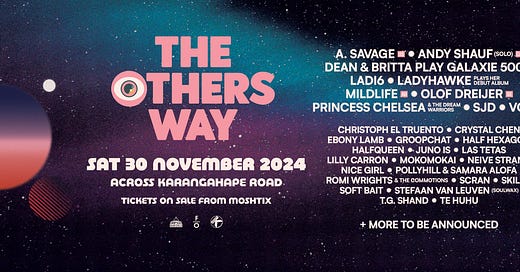Is this music’s toughest job?
Fitting 50 acts onto 10 stages across one hectic night is a programming nightmare for Reuben Bonner. It is, he says, all worth it.
On one side, you've got artists complaining their name is printed in the wrong-sized font, moaning that they should be higher on the poster, or requesting they be placed above another act on the bill.
On the other side, you've got fans griping about timetable issues, whining that they can't be in two places at the same time, or howling about missing out on their favourite artists because of clashes.
Budgets are a problem. Competition for headliners is a problem. Increasing transport costs and staffing shortages are a problem. Selling enough tickets to make your event viable is a problem.
But scheduling acts into timeslots is, many festival programmers have admitted to me lately, among the toughest tasks they face.
It’s the same for Reuben Bonner.
“I’ve got a spreadsheet,” says the director of the Tāmaki Makaurau festival The Others Way. On it are the names of nearly 50 acts spread across 10 venues all booked to play across one hectic night. “You just try and plug it in as best you can and avoid as many clashes as possible.”
He stares at it every day, like the world’s toughest jigsaw puzzle. “I probably move it around 30 times a day, constantly,” he says. But Bonner has an additional problem to tackle: at his indie-leaning event, many of his artists play in multiple acts, a factor that makes his job infinitely harder.
“Julian Dyne was in three projects last year,” says Bonner. “Joe Kaptein is playing in Princess Chelsea, Romi Wrights and Crystal Chen’s band this year.” He was going to offer Kaptein a slot for his solo project too, “but there’s no way you can thread him between four slots.”
It’s been this way since 2015, when The Others Way took over multiple venues on and around K’ Road for the first time, showcasing eclectic line-ups comprised of mostly locals, a melting pot of eager kids, rising acts and a handful of gracefully-aged vets.
With Laneway levelling up to a larger venue with big-name headliners, many say it’s The Others Way that now offers a true representation of the underground, indie and local scenes.
This year, the line-up includes several international acts, including Mildlife, A. Savage, Andy Shauf and Dean & Britta performing songs from the 90s act Galaxie 500. Closer to home, Ladyhawke’s playing her debut album in full, while Princess Chelsea, Ladi6, SJD and Voom are headlining, with an undercard of 40 more acts.
Bonner, who took over the festival last year, says it’s impossible to see every act on the night. He should know – he’s tried. “I tried to see everything last year and it was five or 10-minute pockets,” he says. “You just need to pick a path and recognise you’ll very likely only see half sets rather than full sets … You’ll miss out on some stuff.”
Bonner’s right, but, to me, that’s the beauty of The Others Way. Rather than pulling out your highlighter and planning your night down to the last minute, it’s much better to take a punt, coast about, drift a little, and leave room for detours.
Surprises are baked into the festival. In 2022, Te Kaahu opened the festival in Pitt Street Methodist Church with a stunning set of te reo originals; last year, a young duo set up, for free, in the middle of K’ Road and performed a short, rowdy set of blues-rock originals to a small but delighted crowd. (I’d still love to know who that was.)
Despite having Souls of Mischief, Trinity Roots and Fazerdaze on the bill, Bonner says last year’s event struggled on a weekend that also included performances across town by Kraftwerk, War on Drugs and Matt Corby. “Last year was incredibly hard financially,” he says. “We got a pretty hard walloping.”
It wasn’t bad enough to stop The Others Way going ahead. But this year’s event will have some tweaks: it’s being moved to a Saturday night; The Studio and Verona will be used as venues, and Double Whammy’s bigger space will be utilised.
Bonner has to go – that pesky schedule is nagging at him again. It’s still not quite right. “You don’t quite know who you’re programming to, because you want to program to everyone,” he says. “You want someone to go, ‘There’s three acts on there I really want to see, and then I’ll discover the rest.’”
Ultimately, Bonner says it should be “a weird and wonderful journey” for everyone. “I hope everyone gets behind it sooner rather than later,” he says. “That early buy-in really helps.”
The Others Way, November 30, various K’ Road venues; tickets are available here.
If you like what I’m doing here, please consider showing your support using the bright blue button below. It’s the best way to ensure this newsletter keeps going for as long as it possibly can. (And you’ll be the bestest person ever, obviously.)
Everything you need to know.
Netflix has commissioned a nine-hour Prince documentary and it sounds incredible, a film as conflicted about its subject as many of those interviewed for the project are. According to those lucky enough to have seen it, the film portrays a tortured musical genius, someone with a pattern of creating “closeness that could edge into suffocation” with collaborators and lovers before he ghosted them. The problem? Prince’s estate, who opened the vaults for Ezra Edelman to make this movie, now says it no longer wants it to air. The problems are as twisted as Prince’s legacy, and they’re all documented in this extraordinary story from The New York Times ($$). Make yourself a decent coffee and set aside a good 20 minutes because this is a yarn worthy of your time.
The only thing better than Kendrick Lamar’s recent demolition job on Drake is this New Yorker ($$) deep dive that unpacks the Toronto rapper’s 100 Gigs data dump, describing it as “a profound act of absence, with almost everything worth watching abandoned on a secret hard drive or not filmed at all … a burgeoning star lost in the specious and solitary world of intractable celebrity.” Speaking of Lamar, he’s confirmed as our next Super Bowl half-time show performer.
When Sleater-Kinney performed at The Tuning Fork earlier this year, I wondered why we weren’t all gathered at the superior Powerstation instead. Now, we have our answer: touring giants Live Nation and that venue’s owner Peter Campbell are beefing in a major way. For The Spinoff, Duncan Greive reports on how an altercation occurred backstage at 6lack’s show earlier this year, sparking a “a deep and sustained rift”. Remember, this is a venue that doesn’t like the limelight, so for Campbell to speak out in this way is a huge deal.
I recently rewatched Fyre: The Greatest Party That Never Happened on Netflix and enjoyed it as much as I did first time around. So it pains me to send you to this Washington Post story ($$) that reports on convicted fraudster Billy McFarland’s attempts to make Fyre Festival II happen. Tickets are $8000 and some have sold, yet no artists are booked and no location has been confirmed. “People are going to be hard-pressed to trust me if I put it all on the line and fail at it twice,” McFarland says, correctly. Netflix must be salivating over this.
Here are latest updates on the Oasis ticketing drama that’s evolving so fast it’s nearly impossible to keep up: two more Wembley dates have been announced with NME reporting fans who missed out the first time around get first dibs; meanwhile, the BBC reports Oasis had no idea surge pricing would be used for these sales; and NPR says an investigation is underway into whether Ticketmaster breached consumer protection law. We still don’t know if they’re coming here.
Here’s an absolute smorgasbord of excellent music journalism: Billboard has the first interview with reunited rockers Linkin Park; David Farrier goes to a Creed show and finds a similar vibe to that at a Donald Trump music festival; the New York Times ($$) meets songwriter to the stars, Amy Allen; also from NYT ($$), an interview with your favourite artist’s favourite artist, Mk.Gee; from The New Yorker, MJ Lenderman discusses his excellent new album, and the break-up with his girlfriend, Wednesday front woman Karly Hartzman; and, from The Guardian, after English Teacher took out the latest prize, Alexis Petridis asks, can the Mercury Music Prize survive?
Right now, I want extreme music from either ends of the spectrum, songs that can either soothe me to the point of slumber, or rattle my soul to its very core. With their experimental noise bombs, Providence duo The Body achieve the later, with each hit of their snare and each toe-curling howl combining to form a complete, dystopian whole. Here’s newbie ‘End of Line’ that finds them in devastating form.










Yes to The Body, recent coolab effort was excellent - tres recherche call that!